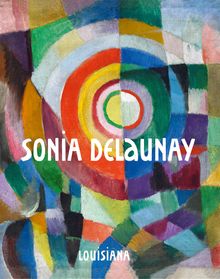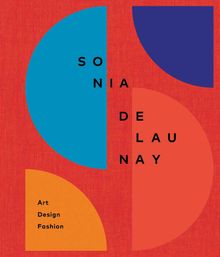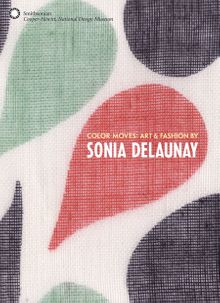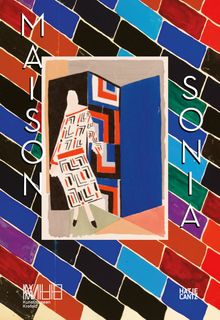| |||||||||||||||||||||||||
ARTIST MONOGRAPHS
|
|
in stock $55.00 Free Shipping UPS GROUND IN THE CONTINENTAL U.S. |
 Sonia Delaunay
Sonia Delaunay
Published by Louisiana Museum of Modern Art.
Edited by Lærke Rydal Jørgensen, Tine Colstrup. Foreword by Poul Erik Tøjner. Text by Tine Colstrup, Griselda Pollock, Anne Montfort-Tanguy, Matteo De Leeuw-De Monti, Cécile Godefroy.
Sonia Delaunay was a true pioneer of modernist abstraction; breaking with the figurative vocabulary that subordinated color to subject matter, she placed dynamic color interaction at the core of her vision, whether expressed through painting, book illustration or costume and textile design. Drawing inspiration from both traditional Russian crafts and the modern frenetic metropolis, Delaunay’s work reflects the drastic changes ushered in by industrialization. Through her polyvalent practice, Delaunay helped construct the new modern woman that she herself embodied: equal parts avant-gardist, creative entrepreneur and businesswoman.
This richly illustrated catalog showcases the range of Delaunay’s work as it unfolded over 60 years, from abstract paintings and works on paper to textile design, garments, fashion photography, books and carpets—even a brightly colored sports car.
Born in Odessa, Ukraine, Sonia Delaunay (1885–1979) migrated to Paris in 1906 and became a key figure in the city’s avant-garde scene. During these early years, her paintings underwent a formal shift influenced by the vivid colors of Fauvism. She soon met her husband, fellow artist Robert Delaunay, and the couple pioneered a fusion of Cubism and Neo-Impressionism that they termed Simultanism, which denotes abstract painting that uses color in a manner comparable to the use of sound and rhythm in music. In 1964, Delaunay became the first living woman artist to have a retrospective at the Louvre.
PUBLISHER
Louisiana Museum of Modern Art
BOOK FORMAT
Hardcover, 8.5 x 10.25 in. / 96 pgs / 150 color / 40 bw.
PUBLISHING STATUS
Pub Date 6/14/2022
Active
DISTRIBUTION
D.A.P. Exclusive
Catalog: FALL 2022 p. 25
PRODUCT DETAILS
ISBN 9788793659537 TRADE
List Price: $30.00 CAD $40.00 GBP £25.00
AVAILABILITY
In stock
in stock $30.00 Free Shipping UPS GROUND IN THE CONTINENTAL U.S. |
 Sonia Delaunay: Art, Design and Fashion
Sonia Delaunay: Art, Design and Fashion
Published by Fundación Colección Thyssen-Bornemisza.
Text by Marta Ruiz del Árbol, Cécile Godefroy, Matteo de Leeuw-de Monti.
Sonia Delaunay: Art, Design, Fashion provides a unified vision of the modernist pioneer’s work in painting, theatrical sets, advertising, interiors, fashion and textiles. Published for a landmark exhibition at Museo Thyssen-Bornemisza in Madrid, and drawing on new scholarship that emphasizes the multidisciplinary character of her art, it reproduces pieces loaned from public institutions such as the Centre Pompidou, the Bibliothèque nationale de France, the Musée de la Mode de Paris and the Museo Reina Sofía in Madrid, as well as from international private collections.
Sonia Delaunay (1885–1979) was raised in St. Petersburg, in Russia. After a brief period of study in Germany, she moved to Paris in 1905, and began painting in the Fauve style of Matisse and Derain. In 1909 she met Robert Delaunay, and together they devised a brighter version of Cubism that their friend the poet and art critic Guillaume Apollinaire termed Orphism. Also among their friends was the poet Blaise Cendrars; one of Delaunay’s best-known works is her 1913 accordion-fold artist’s book collaboration with Cendrars, Prose of the Trans-Siberian Railway. In addition to her prolific 75-year painting career, she created brilliant textiles and fashion works for nearly three decades.
PUBLISHER
Fundación Colección Thyssen-Bornemisza
BOOK FORMAT
Hardcover, 8.5 x 9.5 in. / 236 pgs / 184 color / 52 bw.
PUBLISHING STATUS
Pub Date 10/24/2017
Out of stock indefinitely
DISTRIBUTION
D.A.P. Exclusive
Catalog: SPRING 2018 p. 18
PRODUCT DETAILS
ISBN 9788417173012 TRADE
List Price: $49.95 CAD $67.50 GBP £44.99
AVAILABILITY
Not available
STATUS: Out of stock indefinitely. |
 Color Moves: Art & Fashion by Sonia Delaunay
Color Moves: Art & Fashion by Sonia Delaunay
Published by Cooper Hewitt, Smithsonian Design Museum.
Edited by Matilda McQuaid, Susan Brown. Text by Matilda McQuaid, Petra Timmer, Matteo de Leeuw-de Monti.
Born Sarah Ilinitchna Stern, in the Ukraine, Sonia Delaunay (1885-1979) was raised in St. Petersburg, in Russia. After a brief period of study in Germany, she moved to Paris in 1905, and began painting in the Fauve style of Matisse and Derain. In 1909 she met Robert Delaunay, and together they devised a brighter version of Cubism that their friend, the poet and art critic Guillaume Apollinaire, termed Orphism. Also among their friends was the poet Blaise Cendrars, and one of Delaunay's best-known works is her 1913 accordion-fold artist's book collaboration with Cendrars, La prose du Transsibérien. In addition to her prolific 75-year painting career, she created brilliant textiles and fashion works for nearly three decades.
PUBLISHER
Cooper Hewitt, Smithsonian Design Museum
BOOK FORMAT
Paperback, 8.25 x 10 in. / 200 pgs / 250 color.
PUBLISHING STATUS
Pub Date 5/31/2011
Out of stock indefinitely
DISTRIBUTION
D.A.P. Exclusive
Catalog: SPRING 2011 p. 176
PRODUCT DETAILS
ISBN 9780910503846 TRADE
List Price: $35.00 CAD $47.50
AVAILABILITY
Not available
STATUS: Out of stock indefinitely. |
